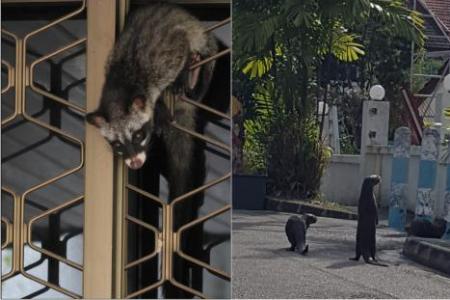What should you do if a wild animal enters your home?
With a recent spate of animals entering homes, the question of what to do in such instances has been on the minds of many.
A reader wrote in to The Straits Times Forum about her brief encounter with hornbills at her balcony, while in September, a group of otters was reported to have eaten a Yio Chu Kang resident's prized koi.
The Straits Times asked some experts what you should do if a wild animal strays into your house.
1. Should you feed the animal?
No; feeding wild animals is prohibited in Singapore.
Under the Wildlife Act, it is illegal to feed any wild animal, including its young. First-time offenders can be fined a maximum of $5,000 while repeat offenders face a maximum fine of $10,000.
Furthermore, feeding wild creatures could interfere with their behaviour.
Ms Anbarasi Boopal, co-chief executive of Acres, a non-profit in Singapore dedicated to wildlife rescues, said: "We definitely urge people not to feed wild animals, not only due to its prohibition, but also because it will condition their behaviour to seek out humans for food.
"This can lead to even more skirmishes between humans and animals in the wild, which are overall detrimental to co-existing."
She noted that there is also sufficient food in the wild for animals to forage.
2. How should you protect your home against wild animal theft?
Wild animals, such as macaques, sometimes visit homes while passing between major areas of habitation.
As a result, experts advise the public to keep food waste and food concealed and lidded to prevent the animals from associating human homes with foraging spots.
Sometimes, the animal may steal what is yours, like otters eating prized pet fish, and bats eating fruit off trees in gardens.
In these cases, experts recommend more specific protective measures to deter the animals, such as draping opaque cloth over fruit to hide them from bats, and installing barriers to prevent otters from entering ponds.
Acres also appeals to the public not to use glue traps or netting to trap animals, as these can cause harm and prolonged suffering to them.

3. What should you do if a wild animal is in your home?
A wild animal visit is often a brush with the unknown and that can feel frightening, but experts say you should not panic - as they would generally be more afraid of you than you are of them.
Dr Shawn Lum, a tropical rainforest ecologist and president of the Nature Society, a non-profit organisation in Singapore dedicated to wildlife appreciation, said: "Wildlife generally have no wish to enter our homes and in the rare instances when they do get in, they want to get out as quickly as they can.
"Wildlife are overwhelmingly not dangerous, and even those that are, for example poisonous snakes such as cobras, will not bite or lash out unless they feel threatened."
The ecologist said that visiting wild animals should be left alone and given a clear exit route, and should not be handled unless a person is experienced.
Eliminate potential threats to their health, for instance turning off ceiling fans to protect flying animals like bats, while waiting for them to leave.
Animals should also not be intentionally harmed, which may also lead the terrified, cornered creature to respond to protect itself, resulting in a potentially bad outcome for all.
Should an animal be injured or trapped, readers can call the National Parks Board's animal response centre on 1-800-476-1600, or Acres on their 24/7 hotline 9783-7782 for advice or assistance.
Get The New Paper on your phone with the free TNP app. Download from the Apple App Store or Google Play Store now


